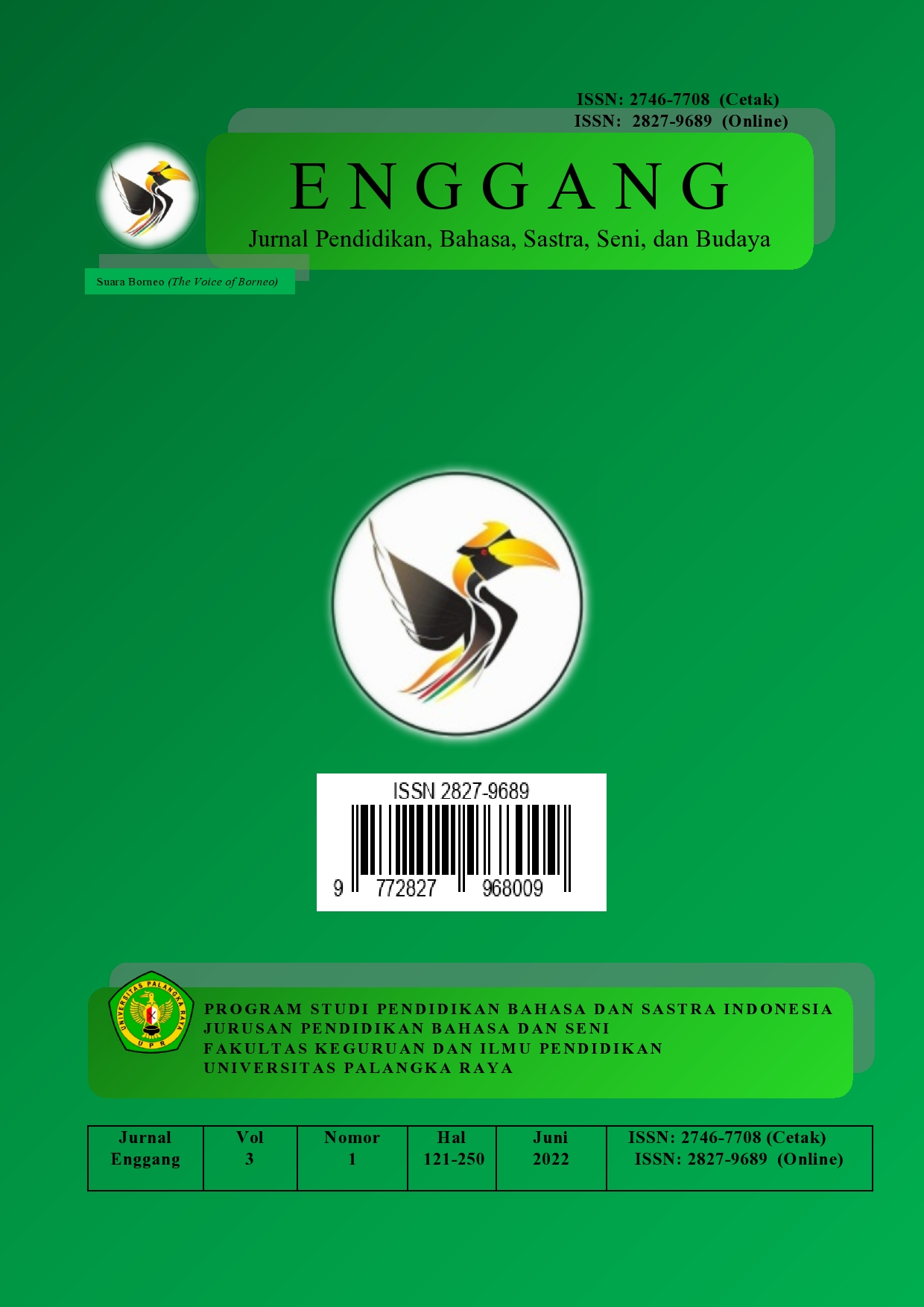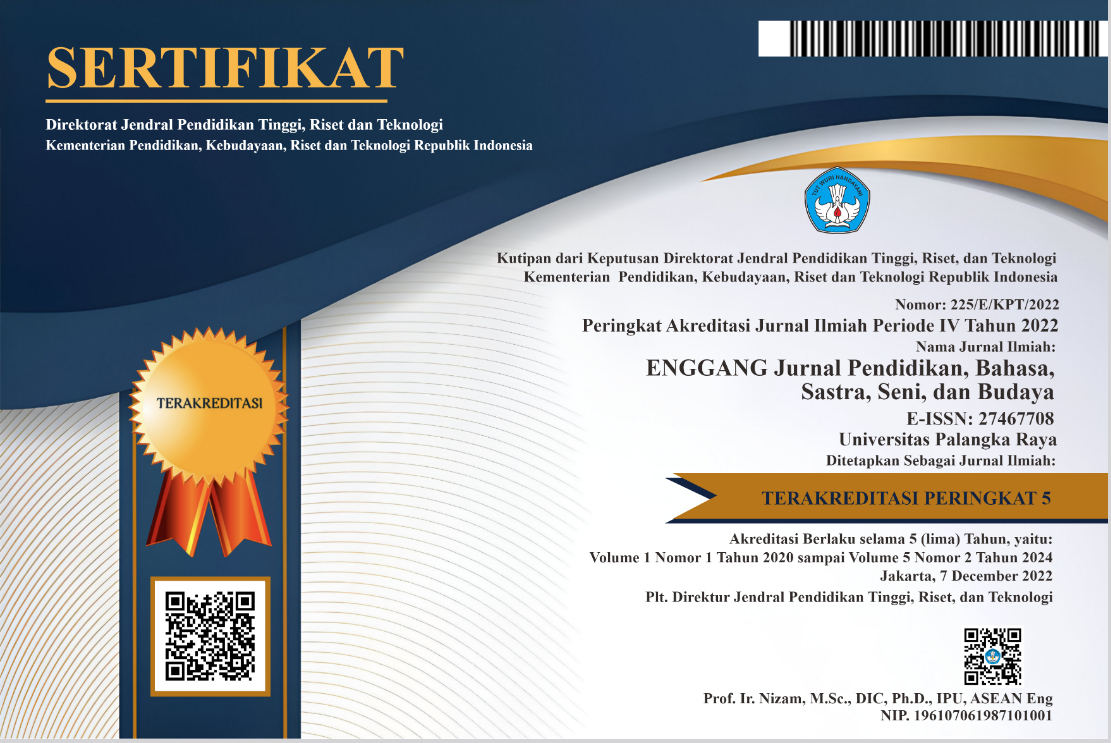Analisis Kejiwaan Tokoh Utama dalam Novel Haru No Sora Karya Laili Muttamimah dengan Pendekatan Psikologi Sastra sebagai Upaya Pembentukan Karakter Peserta Didik
DOI:
https://doi.org/10.37304/enggang.v5i1.18120Keywords:
stress disorder, anxiety, mood, novel Haru No SoraAbstract
Mental disorder is a way of thinking, a meaningful syndrome associated with suffering. The purpose of this study was to describe (1) stress mental disorders (2) anxiety mental disorders (3) mood disorders experienced by the main character in the novel Haru no Sora by Laili Muttamimah with the psychological approach of Sigmund Freud. The type of research used is qualitative with descriptive methods and the data source in this study is the novel Haru No Sora by Laili Muttamimah. The research instrument is the researcher himself who is the main instrument and data collection table. The data analysis technique used was grouping the data, coding the data, then interpreting the data. The results of the data analysis show that there are mental disorders in the novel Haru No Sora by Laili Muttamimah including stress mental disorders contained in the novel Haru no Sora by Laili Muttamimah, namely PTSD/Post-trauma like the death of Mrs. Sora. The anxiety disorders in the novel are generalized anxiety disorders such as excessive worry and tension when meeting Ogawa-san. The mood disorder in the novel is major depression. Sora has a depressed mood, sobs in public places, has trouble concentrating, loses strength, and even plans suicide. Existing mental disorders can be used to shape the character of students in controlling emotions and provide education about mental disorders in adolescents so that they are more familiar with emotions and help those closest to them with mental disorders.
Downloads
References
Aisyah M. Ali. (2018) Pendidikan Karakter: Konsep Dan Implementasinya. Prenada Media
Alfiyah, A., Usop, L. S., Misnawati, M., Nurachmana, A., & Diman, P. (2023). Nilai-Nilai Religius Dalam Novel Buya Hamka Karya Ahmad Fuadi. Atmosfer: Jurnal Pendidikan, Bahasa, Sastra, Seni, Budaya, dan Sosial Humaniora, 1(1), 184-200.
Alwisol, A. (2004). Psikologi Kepribadian. Malang: Universitas Muhammadiyah Malang.
Aziz, A., & Misnawati, M. (2022, July). Nilai Budaya Novel Bulan Terbelah di Langit Amerika oleh Hanum Salsabiela Rais dan Rangga Almahendra. In Prosiding Seminar Nasional Sasindo (Vol. 2, No. 2).
Endraswara, Suwardi. 2013. Metodelogi Penelitian Sastra. Yogyakarta: CAPS.
Fitriani, I., Diman, P., Perdana, I., Misnawati, M., & Jumadi, J. (2023). Representasi Perempuan Abad 21 Dalam Novel Jalan Panjang Menuju Pulang Karya Pipiet Senja Kajian: Feminisme Eksistensialis. Bhinneka: Jurnal Bintang Pendidikan dan Bahasa, 1(4), 190-207.
Hooley, Butcher, Nock, Dan Mineka. (2018). Psikologi Abnormal Edisi 17. Jakarta: Salemba Humanika
Jaya, I. M. L. M. (2020). Metode Penelitian Kuantitatif Dan Kualitatif: Teori, Penerapan, Dan Riset Nyata. Anak Hebat Indonesia.
Kartikasari HS, A., & Suprapto, E. (2018). Kajian Kesusastraan (Sebuah Pengantar).
Lumbanraja, T., Nurachmana, A., Cuesdeyeni, P., Usop, L. S., & Lestariningtyas, S. R. (2023, April). Analisis Aspek Kepribadian Tokoh Utama Dalam Novel Trauma Karya Boy Candra, Implikasinya Terhadap Pembelajaran Sastra di SMA. In PROSIDING SEMINAR NASIONAL PENDIDIKAN, BAHASA, SASTRA, SENI, DAN BUDAYA (Vol. 2, No. 1, pp. 194-203).
Minderop, A. (2010). Psikologi Sastra: Karya, Metode, Teori, Dan Contoh Kasus. Yayasan Pustaka Obor Indonesia.
Nurgiyantoro, B. (1998). Teori Pengkajian Fiksi. UGM Press.
Pati, W. C. B. (2022). Pengantar Psikologi Abnormal: Definisi, Teori, Dan Intervensi. Penerbit Nem.
Sari, A. R., Usop, L. S., Lonarto, L., Peronika, N. W., & Fauzi, R. (2022, May). Analisis Karakter Tokoh Dalam Novel Aku Mencintainya Mama Karya Fredy S. In PROSIDING SEMINAR NASIONAL PENDIDIKAN, BAHASA, SASTRA, SENI, DAN BUDAYA (Vol. 1, No. 1, pp. 46-59).
Satinem. (2019). Apresiasi Prosa Fiksi:Teori, Metode, Dan Penerapannya. Deepublish
Semi, M. A. (2012). Metode Penelitian Sastra. Bandung: Angkasa.
Siswantoro. (2016). Metode Penelitian Sastra. Yogyakarta: Pustaka Pelajar.













